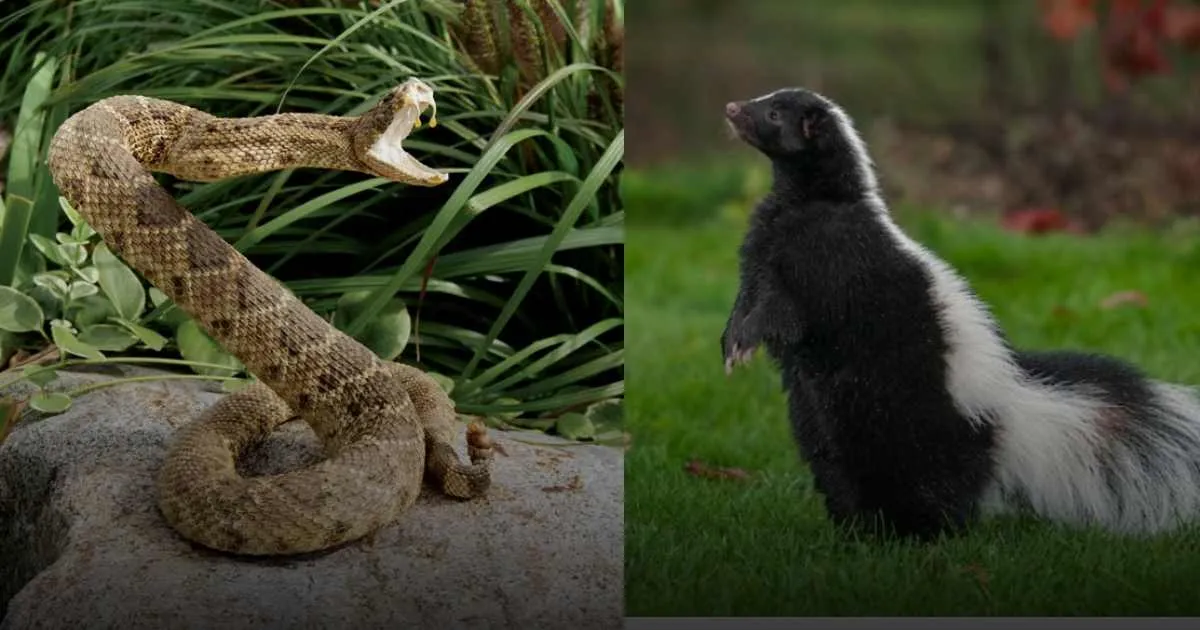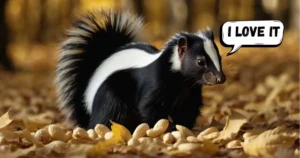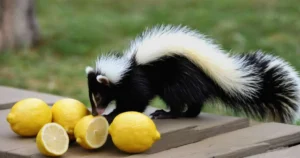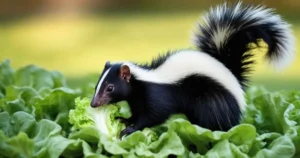Can Skunks REALLY Eat Rattlesnakes? The Surprising Truth
Skunks are pretty fascinating creatures! You might know them for their black and white stripes and their stinky spray, but did you know they sometimes munch on rattlesnakes? Yep, even though it seems risky, skunks are immune to rattlesnake venom, so they can snack on them when food is scarce. These furry foragers have a varied diet, gobbling up insects, small animals, fruits, and, yep, even the occasional snake! It’s pretty cool how they can eat dangerous reptiles without getting sick. By learning what skunks eat, we can understand how they survive in the wild and keep ecosystems in balance. So, if you’re curious about these clever critters and their surprising eating habits, stick around to learn more!
Skunks And Rattlesnakes: A Mysterious Interaction
Think of the animal kingdom, and predators are often what come to mind. But among the most surprising interactions is that between skunks and rattlesnakes. It’s an unusual clash where you wouldn’t guess who might win. Let’s delve into this intriguing dynamic.
The Skunk’s Diet: An Omnivorous Lifestyle
Skunks are well-known for their pungent defense mechanism. But their diet is quite diverse. In the wild, these creatures are omnivores, meaning they eat both plants and animals.
- Insects
- Fruits
- Small rodents
- Amphibians
- Eggs
They are not picky and will feast on what’s available, maintaining a balanced diet through the seasons.
Rattlesnake Predators: An Unexpected Menu Item
Rattlesnakes, fierce as they may be, have predators of their own. Skunks are amongst these unexpected foes. Despite the snake’s venom, a skunk might emerge victorious in this fight.
The skunk’s approach is stealthy and precise. A single bite can be enough to subdue a rattlesnake. Their immunity to venom gives them a significant edge.
| Rattlesnake Defenses | Skunk Strategy |
|---|---|
| Venomous Bite | Venom Immunity |
| Camouflage | Keen Detection |
| Loud Rattle | Nonchalant Approach |
The table above details how skunks counter rattlesnake defenses. The interaction is a testament to nature’s complexity and the survival skills of these creatures.
Natural Defenses: Skunks Vs. Rattlesnakes
In the wild, survival hinges on the might of one’s natural defenses. Skunks and rattlesnakes present perfect examples of nature’s ingenuity, both possessing unique abilities for protection and hunting. This post delves into the fascinating ways these creatures go head to head, relying on their distinct capabilities to emerge victorious.
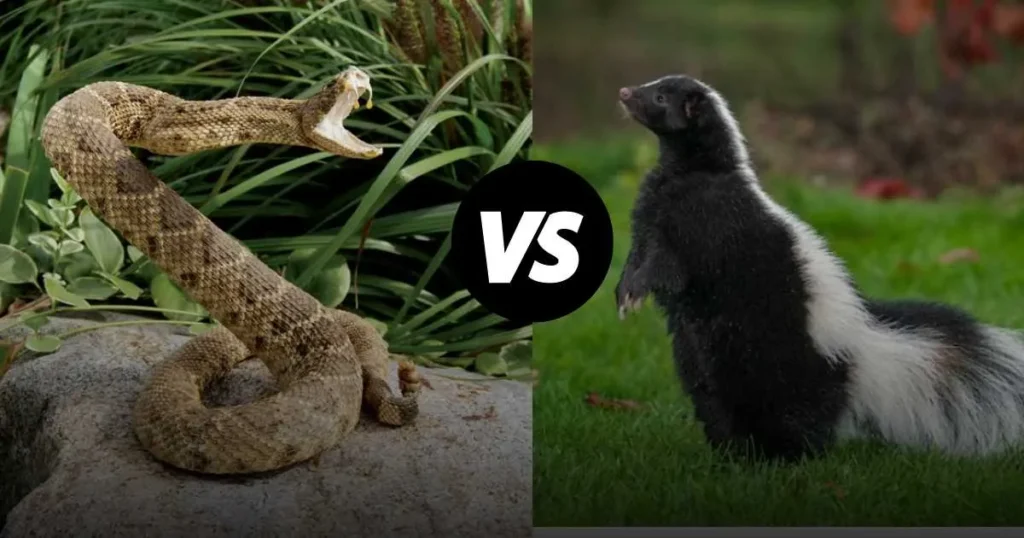
Skunk’s Chemical Arsenal
Skunks wield an infamous weapon: their spray. This noxious chemical can shoot up to 10 feet and cause temporary blindness, allowing skunks to escape or deter predators, including rattlesnakes.
- Repellent power: The skunk’s spray is an odorous oil, difficult to wash off.
- Accuracy: Skunks have excellent aim and can direct their spray with precision.
- Safety: Skunks rarely waste this precious defense and use it only when threatened.
Rattlesnake’s Venomous Bite
In contrast, rattlesnakes boast venom that can incapacitate or even kill with a single bite. They use their sharp fangs to deliver venom deep into their victim’s flesh.
| Feature | Feature |
|---|---|
| Hemotoxins | Destroy tissue, disrupt blood clotting. |
| Neurotoxins | Impair nervous system, paralyze prey. |
| Delivery | Injected via hollow fangs, quick and efficient. |
Skunks, however, have developed a tolerance to snake venom over time, making them capable contenders in this battle of defenses.
Hunter Or Hunted: Skunks Taking On Rattlesnakes
In the animal kingdom, unexpected matchups often occur, and the confrontation between skunks and rattlesnakes is one of those nature’s curious battles. Contrary to what one might assume, these striped mammals sometimes turn from the hunted into formidable hunters.
Skunks, known for their notorious defense mechanism, don’t always shy away from a challenge. The scenario of a skunk preying on a rattlesnake brings up fascinating questions about their behavioral strategies.
Tactics Skunks Use To Subdue Snakes
Skunks possess unique tactics to take on the perilous rattlesnakes. They rely on stealth and surprise, approaching their prey with caution.
- Immunity to Snake Venom: Skunks have a natural resistance to snake venom, making them bold adversaries.
- Using Thick Fur: Their long fur acts as a protective barrier against bites.
- Agile Movements: Quick and agile, they dodge the snake’s strikes with ease.
Why Skunks Risk The Snake Encounter
You may wonder, why do skunks engage with such dangerous reptiles? The answer lies in their survival instincts and dietary preferences.
- Food Source: Rattlesnakes are a hearty meal for omnivorous skunks.
- Reduced Competition: Fewer animals target snakes, so skunks face little competition here.
- Natural Curiosity: Skunks are inquisitive creatures, often investigating potential food sources out of curiosity.
Battle Of Survival: Instances Of Skunks Eating Rattlesnakes
The ‘Battle of Survival: Instances of Skunks Eating Rattlesnakes’ is a fascinating glimpse into the unexpected dietary habits of skunks. These small creatures are typically known for their defensive spray. Few recognize their role as predators to one of the most feared reptiles: rattlesnakes.
Evidence From The Wild
Nature often presents scenarios that seem out of an adventure novel. Skunks, with their keen sense of smell, track down rattlesnake nests and consume young snakes. Biologists have documented these occurrences by examining skunk droppings and stomach contents.
- Skunk droppings: Often contain rattlesnake scales and bones.
- Stomach analysis: Reveals remnants of rattlesnake DNA.
These findings place skunks on the list of rattlesnake predators, showcasing their importance in local ecosystems.
Witnessed Accounts And Research Findings
Video footage and live observations add to the pool of evidence.
- Researchers have captured videos of skunks attacking rattlesnakes.
- Field specialists note instances where skunks emerge from battles unharmed, rattlesnake in tow.
Scientific studies support these visual accounts. Immunity to snake venom allows skunks to triumph in these fights. Skunks not only avoid envenomation but also seize the opportunity for a meal.
| Skunk Behavior | Outcome |
|---|---|
| Use of sense of smell | Locates snakes |
| Engagement in combat | Often kills rattlesnake |
| Immunity to venom | Survives bites and consumes prey |
These interactions between skunks and rattlesnakes highlight a complex food web. Skunks play a crucial role in regulating rattlesnake populations. Such dynamics are essential for maintaining balance within their shared habitats.
The Anomaly In Nature: Understanding Predatory Behavior
In the wild, every creature has a role to play. Some relationships between predator and prey seem unusual. Skunks, known for their pungent defense, have a surprising trait. They sometimes eat rattlesnakes. Let’s explore this peculiar behavior.
Skunk’s Immunity To Snake Venom
Skunks have a secret weapon. It’s not just their smell. They resist snake venom. This trait allows them to hunt slithery dangers others avoid. Scientists study this immunity to learn more.
Surprising facts:
- Alpha-bungarotoxin: This toxin in venom doesn’t affect skunks much.
- Genetic advantage: Skunks evolved to resist venom over time.
Rattlesnake: A Meal Or A Mistake?
Skunks don’t often eat rattlesnakes. But when they do, it’s a calculated risk. Skunks use their immunity and quick reflexes. They aim to kill the snake before it bites.
| Skunk Strategy | Snake Response |
|---|---|
| Approach with caution | Rattles as warning |
| Quick attack | Attempt to bite |
| Eat if successful | Escape if possible |
Is this a usual meal? No. Is it a mistake? Also, no. It’s a rare display of nature’s complexity. Skunks eating rattlesnakes shows the balance of survival in the wild.
Impact On Ecosystems: Predator-prey Dynamics
The balance of nature hinges on the delicate dance between predator and prey. In ecosystems across the globe, this dynamic dictates the survival and thriving of species. Skunks, with their eclectic diet, can have an intriguing impact on their fellow inhabitants, including one surprising fellow predator: the rattlesnake.
Effect On Rattlesnake Populations
In some regions, skunks play a role in controlling rattlesnake numbers. Skunks are immune to snake venom, which gives them an edge in hunting these reptiles. By preying on young and small rattlesnakes, skunks can influence the population and distribution of these snakes. The effect on rattlesnake populations, while not the primary control factor, adds a significant layer to the ecosystem’s complexity.
Role In Controlling Rodent Prey
- Regulate rodent numbers: Skunks feed on various rodents, which are also prey for rattlesnakes.
- Balance species interactions: Their dietary habits can lessen the predation pressure rattlesnakes put on rodent populations.
- Maintain plant health: By keeping rodent populations in check, skunks indirectly protect plant communities rodents might otherwise overgraze.
Thus, skunks contribute to maintaining a balance in the food web, impacting both fellow predators like rattlesnakes and common prey such as rodents. This balance is crucial for the health and sustainability of ecosystems.
Conservation And Protection: Human Impact
Conservation and Protection: Human Impact delves into the intertwined lives of skunks and rattlesnakes. These creatures share habitats and sometimes, the food chain. Skunks indeed eat rattlesnakes, but such interactions reflect a complex ecosystem that humans influence significantly. Ensuring the survival of both species requires understanding and action. Humans can either threaten or contribute to their preservation.
Conservation Efforts For Rattlesnakes
Rattlesnakes, often perceived as dangerous, struggle to survive amidst human encroachment. Their habitats face destruction for development. To protect them:
- Create protected areas to safeguard their natural habitats.
- Limit rodenticide use, which can poison rattlesnakes indirectly.
- Support laws that prevent illegal killing and trading.
Conservation programs aim to maintain rattlesnake populations at healthy levels. This is crucial for ecosystem balance.
Human Interaction: Protecting Skunks
Skunks have a reputation for being a stinky nuisance. Yet, they are important for controlling pests. Protecting skunks involves:
- Educating the public about the positives of having skunks around.
- Implementing humane deterrents to keep them away from homes.
- Designing safer road crossings to reduce fatalities.
By protecting their habitats and avoiding harmful interactions, we help skunks thrive. Responsible coexistence is key for their conservation.
Education And Awareness: Debunking Myths
Wildlife tales often weave a web of myths, casting shadows on facts. It’s time to shine a light on what skunks really munch on. Is the snake-eating skunk a legend or truth? Let’s unearth the wildlife wonders and set the record straight.
Separating Fact From Fiction
Skunks have a diverse diet, that much is true. Insects, small mammals, and plants often make the menu. But, rattlesnakes? Not quite the delicacy we might imagine. Skunks have the tools to take on snakes, yes. They can spray a foul odor that can make predators, including snakes, think twice. But, a rattlesnake isn’t a go-to meal for these creatures.
One striking fact: Skunks may accidentally encounter rattlesnakes during their adventures, and if pushed, they’ll defend. Yet, scenes of skunks hunting rattlesnakes are more myth than reality. To understand their true eating habits requires a peek into credible research and educational materials.
Educational Resources For A Better Understanding
Turning to reliable sources clarifies misconceptions. Experts in wildlife biology provide insights that help us understand skunks better.
- Books and papers written by zoologists
- Wildlife conservation organizations’ databases
- Educational videos featuring skunks in their natural habitat
Interactive resources like documentaries reveal the reality of skunk behavior. Observing skunks in action shows us a world beyond the tall tales. Such resources foster knowledge that replaces fiction with facts.
Learning from experts is crucial. It encourages an accurate understanding of wildlife. Embracing education means recognizing that skunks have little interest in rattlesnakes as prey.
Frequently Asked Questions
Skunks can deter rattlesnakes due to their smell and digging habits which disrupt the snakes’ environment. Skunks may eat smaller snakes, adding a level of natural repellence.
Skunks can indeed eat venomous snakes. Their thick fur offers protection against bites, and they have immunity to some types of snake venom.
Skunks possess a natural resistance to rattlesnake venom, making them less susceptible to the effects of snake bites.
Conclusion
Nature’s food chain offers many surprises, such as skunks preying on rattlesnakes. Although rare, this unexpected behavior highlights skunks’ adaptive diets and resilience. Remember, while skunks can indeed tackle venomous snakes, such instances are exceptional. Share this intriguing fact and keep exploring the wonders of the animal kingdom!

